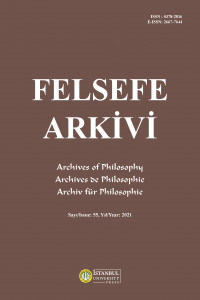Öz
Phaidon diyaloğunda Sokrates, dostlarıyla birlikte ruhun ölümsüzlüğü üzerine konuştuktan sonra, Kebes’in itirazı üzerine ona doğru dönerek hakikati arayış yolculuğunda kendi hayat hikayesi ve tecrübesini paylaşır. Kebes’e göre ruhun bu dünyadan önce var olması, sonrasında da varlığını sürdüreceği anlamına gelmez. Ayrıca ona göre bedenden bedene dolaşan ruh, bu dolaşımla yok olup gider ve bu nedenle ölümsüzlük diye bir şeyden bahsedilemez. Bu bağlamda Sokrates, ruhun ölümsüzlüğüne ilişkin Kebes’in itirazını ele almanın zorluğuna işaret eder ve bu meselede oluş ve bozuluşun nedeninin araştırılması gerektiğini ifade eder. Bu noktada Sokrates gençlik yıllarında kendisinin de “neden” arayışı içerisinde olduğundan ve Anaksagoras başta olmak üzere doğa araştırmacılarından etkilendiğinden bahseder. Öte yandan Sokrates doğal neden arayışındaki umutlarının da boşa çıktığını belirtir. Bu umut yitiminden sonra Sokrates ‘logoi’a sığınma’ olarak belirttiği “ikinci yolculuğa” (deuteros plous) çıkar. Oluş dünyasına tabi her şeyin kendisine göre gerçekleştiği ilkesel nedeni doğanın içinde arayan düşünürlerin çelişkilerini fark eden genç Sokrates’in, fiziki dünyadan metafiziğe doğru seyreden yolculuğu bu yazının konusunu oluşturmaktadır. Ayrıca bu yazının amacı, ruhun ölümsüzlüğü gibi bir meselede, Sokrates’in kendi hayat hikayesini paylaşmasının gerekçesini araştırmak ve buradan hareketle Kebes’in itirazına yönelik Sokratik arayışın izlerini sürmektir.
Anahtar Kelimeler
Kaynakça
- Bedu-Addo, J. T. “The Role of the Hypothetical Method in the Phaedo”. Phronesis 24/2 (1979): 111-132.
- Byrd, Miriam Newton. “Dialectic and Plato’s Method of Hypothesis”, Apeiron 40/2 (2007): 141-158.
- Freydberg, Bernard. “Sallis on Deuteros Plous: The Philosopher as Voyager”. The Journal of Speculative Philosophy 27/ 2 (2013): 199-207.
- Haşlakoğlu, Oğuz. Platon Düşüncesinde Tekhné: Sanat ve Felsefenin Ortak Kökeni Üzerine Bir İnceleme. İstanbul: Sentez Yayınları, 2016.
- Murphy, N. R. “The Δεύτερος Πλου̂ς in the Phaedo”. The Classical Quarterly 30/2 (1936): 40-47.
- Pakaluk, Michael. “The Ultimate Final Argument”. The Review of Metaphysics 63/3 (2010): 643-677.
- Platon. Euthyphro, Apology, Crito, Phaedo, Phaedrus. Çeviren H. N. Fowler. Cambridge: Harvard University Press, 2005.
- Platon. Phaidon. Çeviren Nazile Kalaycı. İstanbul: Pharmakon, 2020.
- Platon. Devlet. Çeviren. Hüseyin Demirhan. İstanbul: Sosyal Yayınları, 2002.
- Rose, Lynn E. “The Deuteros Plous in Plato’s Phaedo”. The Monist 50/3, (1966): 464-473.
- Ross, David. Plato’s Theory of Ideas. Oxford: Clarendon Press, 1951.
- Ross, Donald L. “The Deuteros Plous, Simmias’ Speech, and Socrates’ Answer to Cebes in Plato’s Phaedo”. Hermes 110/1 (1982): 19-25.
- Sallis, John. Being and Logos: Reading the Platonic Dialogues. Indianapolis: Indiana University Press, 1996.
- Seferoğlu, Tonguç. “A Metaphilosophical Reading of Plato’s Phaedo.” Doktora tezi, King’s College London, 2018.
- Sprague, Rosamond Kent. “Socrates’ Safest Answer: Phaedo 100D”. Hermes 96/4 (1968): 632-635.
Öz
In the dialogue of Phaedo, Socrates talks about the immortality of the soul with his friends and shares his life story and experience in his journey of seeking the truth after Cebes’ objection to immortality. According to Cebes, the soul’s existence prior to this world does not imply that it will continue to exist beyond it. Furthermore, the spirit that circulates from one body to another perishes as a result of this circulation; hence, there is no such thing as immortality. Socrates emphasizes the difficulties of dealing with Cebes’ objection to the immortality of the soul in this setting and adds that the reason of becoming and corruption in this subject should be investigated. At this point, Socrates explains how, in his youth, he was likewise looking for “cause,” and how nature researchers, particularly Anaxagoras, impacted him. Whereas, Socrates also states that his glorious hope was quickly snatched away from him. After this loss of hope, Socrates takes on the “second voyage” (deuteros plous), which he refers to as “taking refuge in the logoi.” The subject of this article is the second voyage of young Socrates who perceived the contradictions of the thinkers who look for the principal cause in nature and the Socratic quest that progresses from a physical journey to metaphysics in a way. In addition, this article aims to investigate the reason why Socrates shared his own life story in terms of the causal explanation of this world on a subject such as the immortality of the soul and to follow the traces of the Socratic search from this point of view.
Anahtar Kelimeler
Kaynakça
- Bedu-Addo, J. T. “The Role of the Hypothetical Method in the Phaedo”. Phronesis 24/2 (1979): 111-132.
- Byrd, Miriam Newton. “Dialectic and Plato’s Method of Hypothesis”, Apeiron 40/2 (2007): 141-158.
- Freydberg, Bernard. “Sallis on Deuteros Plous: The Philosopher as Voyager”. The Journal of Speculative Philosophy 27/ 2 (2013): 199-207.
- Haşlakoğlu, Oğuz. Platon Düşüncesinde Tekhné: Sanat ve Felsefenin Ortak Kökeni Üzerine Bir İnceleme. İstanbul: Sentez Yayınları, 2016.
- Murphy, N. R. “The Δεύτερος Πλου̂ς in the Phaedo”. The Classical Quarterly 30/2 (1936): 40-47.
- Pakaluk, Michael. “The Ultimate Final Argument”. The Review of Metaphysics 63/3 (2010): 643-677.
- Platon. Euthyphro, Apology, Crito, Phaedo, Phaedrus. Çeviren H. N. Fowler. Cambridge: Harvard University Press, 2005.
- Platon. Phaidon. Çeviren Nazile Kalaycı. İstanbul: Pharmakon, 2020.
- Platon. Devlet. Çeviren. Hüseyin Demirhan. İstanbul: Sosyal Yayınları, 2002.
- Rose, Lynn E. “The Deuteros Plous in Plato’s Phaedo”. The Monist 50/3, (1966): 464-473.
- Ross, David. Plato’s Theory of Ideas. Oxford: Clarendon Press, 1951.
- Ross, Donald L. “The Deuteros Plous, Simmias’ Speech, and Socrates’ Answer to Cebes in Plato’s Phaedo”. Hermes 110/1 (1982): 19-25.
- Sallis, John. Being and Logos: Reading the Platonic Dialogues. Indianapolis: Indiana University Press, 1996.
- Seferoğlu, Tonguç. “A Metaphilosophical Reading of Plato’s Phaedo.” Doktora tezi, King’s College London, 2018.
- Sprague, Rosamond Kent. “Socrates’ Safest Answer: Phaedo 100D”. Hermes 96/4 (1968): 632-635.
Ayrıntılar
| Birincil Dil | Türkçe |
|---|---|
| Konular | Felsefe |
| Bölüm | Araştırma Makaleleri |
| Yazarlar | |
| Yayımlanma Tarihi | 31 Aralık 2021 |
| Yayımlandığı Sayı | Yıl 2021 Sayı: 55 |

